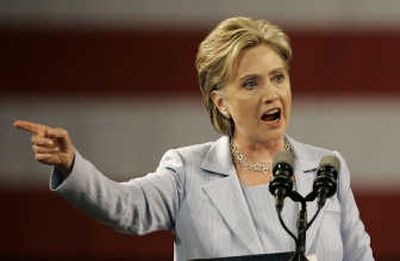Hard line on Iran divides Clinton from rival

WASHINGTON – Sen. Hillary Rodham Clinton, D-N.Y., has ratcheted up her rhetoric against Iran, pledging recently to extend U.S. nuclear protection to friendly Arab nations against Iran’s nuclear ambitions and asserting that if Tehran considers attacking Israel, “we would be able to totally obliterate them.”
The Iranian government lashed out last week in response, with an Iranian diplomat at the United Nations condemning Clinton’s statement as “provocative, unwarranted and irresponsible.” In a letter to Secretary-General Ban Ki-moon, Iran’s deputy U.N. ambassador, Mehdi Danesh-Yazdi, also referred to Clinton’s threat as a “flagrant violation” of the U.N. Charter. Clinton’s campaign dismissed the letter.
The exchange underscores Clinton’s apparent effort to distinguish herself from her rival for the Democratic presidential nomination, Sen. Barack Obama of Illinois, by offering a more hawkish approach to world affairs.
Few foreign policy issues have divided the candidates more than how to deal with Iran. Obama has offered to hold direct talks to halt Iran’s nuclear program. Sen. John McCain of Arizona, the presumptive Republican nominee, has cast doubt on the value of such negotiations, and Clinton falls between the two.
Clinton first advanced the idea of a new defensive alliance with Arab states last month during an ABC News debate with Obama in the days before the Pennsylvania primary, after the candidates were asked if they would extend the U.S. “security umbrella” to Israel in the event that Iran obtains nuclear weapons.
Both responded affirmatively, but Clinton went further. She said she would “provide a deterrent backup” that would extend U.S. nuclear protection beyond Europe and Japan to Saudi Arabia, Kuwait and other Arab countries, guaranteeing “massive retaliation” if Iran targeted Israel or Arab allies. The Arab countries – but not Israel – would have to promise not to obtain nuclear weapons, which Clinton said would prevent a nuclear arms race in the region.
Some analysts have praised her proposal as a bold initiative, but it has also attracted concerns about its feasibility and whether it would tie the hands of a future president.
“This is a very big and important proposal, maybe one of the most important any candidate has made all year,” said Bruce Reidel, a former CIA official who says he is neutral on the presidential race. “This is committing the United States to the defense of these countries. It has flaws, but it is a creative way to deal with” a nuclear-armed Iran.
The Bush administration has struggled to thwart Iran’s nuclear program, pushing for U.N. sanctions and offering to join other major powers in talks if Tehran suspends its nuclear activities. But Iran has shrugged off the pressure.
Some experts are wary of Clinton’s proposal. Doug Bandow, a Reagan administration official and a fellow with the American Conservative Defense Alliance, noted that Israel already has a nuclear deterrent: an estimated 200 weapons of its own.
Clinton’s idea, he said, would elevate Iran, a regional power without global reach, to the status of the Soviet Union. “It’s clearly a political statement in terms of winning votes, and utterly irresponsible,” said Bandow.
As tension grew with the Soviet Union more than half a century ago, the United States pledged to respond to a nuclear attack on NATO allies, Japan or South Korea with a nuclear counterstrike. The Obama campaign suggests Clinton threw out the idea without much consideration of its impact, and in effect is giving up on preventing Iran from obtaining a nuclear weapon. “It is a controversial idea that raises many serious unanswered questions, and it was unveiled in a most haphazard and almost reckless way,” said Susan Rice, an Obama adviser. “It presupposes an outcome that responsible people want to prevent.”
Lee Feinstein, Clinton’s national security director, said the candidate is signaling to Tehran that seeking nuclear weapons is useless. “She has made clear to Iran that if your policy aim is to be able to intimidate your neighbors, that is not going to succeed,” he said.